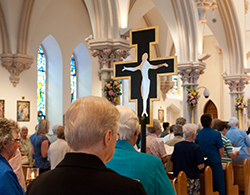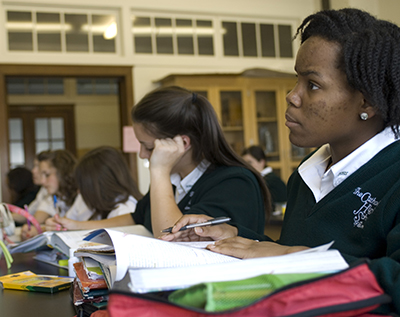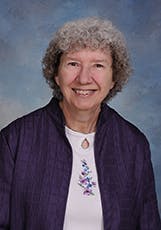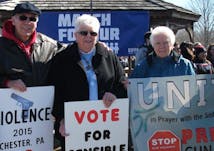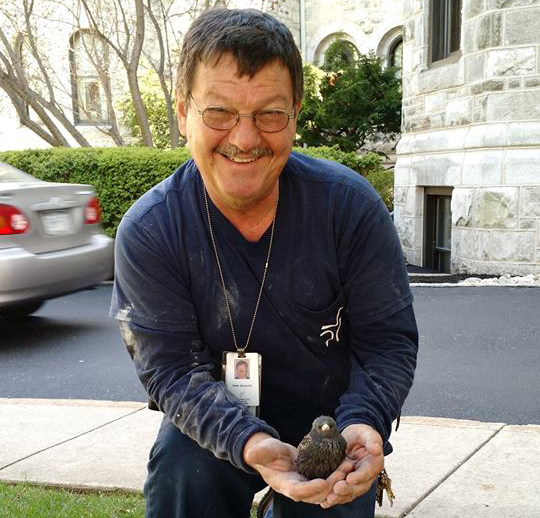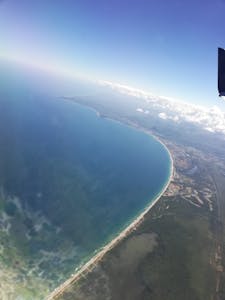
It was a hot sunny day when we landed in San Pedro Sula in Honduras in the early afternoon on March 18.
This was my second delegation in this beautiful Central American country. This time I was here to see for myself why so many people choose to migrate and make the long, difficult, and dangerous journey north to the U.S. southern border. Because it was my second time, I knew what to expect and was able in this way to see more, to feel more, and to observe what I was not able to grasp and capture the first time. I was able to see things with open eyes and an open heart.
As soon as I stepped outside the customs at the airport, I was pleasantly enveloped in the welcoming, noisy environment of a Latin American country. I felt at home almost immediately and was happy to be back. People responded to my gladness to be among them with an easy smile.
As we left the airport, I noticed that everything was very dry. I was made aware that certain areas of Honduras are experiencing a four year drought and I thought; “This is not helping the struggle of the few farmers left in this country.”
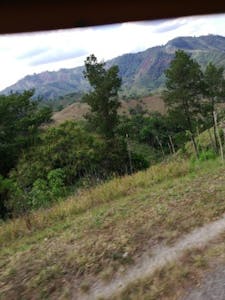 Honduras is indeed a beautiful country—blessed with fertile land, rolling hills, clean rolling rivers, and miles of coast on the Gulf of Honduras and the Caribbean Sea. I experienced this beauty as we traveled—after a brief stop in La Ceiba on the Ocean—to the remote village of Guapinol and the municipality of Tocoa in the north. The Bayo Aguan region is blessed with the pristine waters of the Aguan River. It is here that a few months ago a group of land and water defenders confronted the combined powers of big business (extracting mines) and their allies—politicians who sought to criminalize their protest and thus silence them. They were protecting their water from mine run off. Without water there is no life. In our visit to the mayor, I tried to ask if he could he please help them to make sure that their source of life is preserved, clean, and usable? Not much came from that meeting.
Honduras is indeed a beautiful country—blessed with fertile land, rolling hills, clean rolling rivers, and miles of coast on the Gulf of Honduras and the Caribbean Sea. I experienced this beauty as we traveled—after a brief stop in La Ceiba on the Ocean—to the remote village of Guapinol and the municipality of Tocoa in the north. The Bayo Aguan region is blessed with the pristine waters of the Aguan River. It is here that a few months ago a group of land and water defenders confronted the combined powers of big business (extracting mines) and their allies—politicians who sought to criminalize their protest and thus silence them. They were protecting their water from mine run off. Without water there is no life. In our visit to the mayor, I tried to ask if he could he please help them to make sure that their source of life is preserved, clean, and usable? Not much came from that meeting.
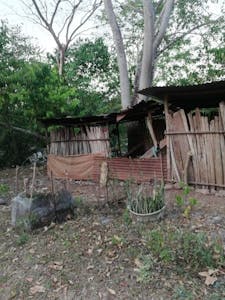 The sacrifice and tenacity of the people of Guapinol really struck and touched me. Their welcome was sincere and their joy authentic. I reflected on their strength and also noticed the poverty in which some of them live. The few that are a little better off are those who receive money from relatives in the U.S. What is left for them but to fight when the very source of life is taken away from them? I observed, I tried to speak a few words in broken Spanish and smiled a lot. However, I found myself becoming more and more sad, upset, and really angry at the way things are in the world. I have seen poverty in my life. My time in East Africa was one of those times but as I get older and I learn that it does not have to be this way, I find that I would like to scream at our leaders and at any one who wants to listen. We are contributing to this! Our government is doing it in our name! We—the Americans—are doing this to these people by supporting the wrong causes, by supporting the powerful instead of making sure that with our financial help, they do the right thing for people. Unfortunately, most of the aid we are sending to Honduras goes to the military who in turn oppress their people and militarize the nation in the name of national security. If I learned one thing, it is that we need to make our leaders accountable for what they do.
The sacrifice and tenacity of the people of Guapinol really struck and touched me. Their welcome was sincere and their joy authentic. I reflected on their strength and also noticed the poverty in which some of them live. The few that are a little better off are those who receive money from relatives in the U.S. What is left for them but to fight when the very source of life is taken away from them? I observed, I tried to speak a few words in broken Spanish and smiled a lot. However, I found myself becoming more and more sad, upset, and really angry at the way things are in the world. I have seen poverty in my life. My time in East Africa was one of those times but as I get older and I learn that it does not have to be this way, I find that I would like to scream at our leaders and at any one who wants to listen. We are contributing to this! Our government is doing it in our name! We—the Americans—are doing this to these people by supporting the wrong causes, by supporting the powerful instead of making sure that with our financial help, they do the right thing for people. Unfortunately, most of the aid we are sending to Honduras goes to the military who in turn oppress their people and militarize the nation in the name of national security. If I learned one thing, it is that we need to make our leaders accountable for what they do.
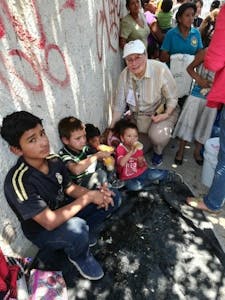 I became even angrier when, not far from the American embassy, on the sidewalk of a busy street in the capitol Tegucigalpa, close to 80 people have made their home. Why? A few days before they were evicted from their land and homes by the rich family in the area who is slowly depriving people of their land because land reform was never completed. The people do not have titles to show that it is theirs and nor do they have money to pay the rent.
I became even angrier when, not far from the American embassy, on the sidewalk of a busy street in the capitol Tegucigalpa, close to 80 people have made their home. Why? A few days before they were evicted from their land and homes by the rich family in the area who is slowly depriving people of their land because land reform was never completed. The people do not have titles to show that it is theirs and nor do they have money to pay the rent.
The wealthy—who run the country—are constantly adding more land to a mono crop of African palm oil which grows well in parts of Honduras but destroys the land for future crops for decades. The palm fruits are not processed in the country so it creates no jobs for the people. No land, no jobs—and people live on the sidewalk.
I went to see the root causes of migration and I found a country of strong people. However, in a country with almost 70% of its people living in poverty and 44% living in misery, there is really no alternative but to go somewhere else in order to survive.
The U.S. supports the unlawful presidency of Juan Orlando Hernandez. As a country, once again we support a dictator who is oppressing his people and who is certainly not working for the well-being of the country and its citizens. What are we getting in return? Maybe a military presence in the region? Learn more here
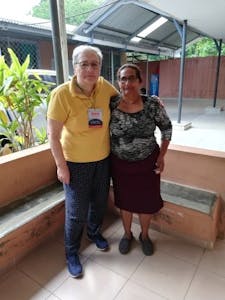
Our president wants to close the border. How will that be a solution for the people who are coming to save their lives? Maybe it is about time that, as the United States of America, we use our influence to help resolve the enormous issues inside a country so that its people are not forced to leave, but can happily stay in their land.
As the beautiful and courageous people of Guapinol continue their fight for survival, I am more determined than ever to speak the truth for them. I want to speak for Orbelina who cannot go home anymore because her life was threatened many times—so she stays with friends day by day, night by night. Her determination to continue to stay in the struggle for her people and for her family touched me deeply. What choice do I have but to stay in another struggle beyond the border because, as Martin Luther King said, “Our lives begin to end the day we become silent about things that matter”
I know my companions have also written beautiful and fact laden articles/blogs. I am adding some here for those who desire to know more and may be advocates for the people of Honduras.
https://www.flickr.com/photos/146051055@N02/albums/with/72157704300410982
https://www.sistersofmercy.org/blog/2019/03/28/which-country-do-you-come-honduras/
https://www.americamagazine.org/politics-society/2018/11/07/why-are-so-many-people-fleeing-honduras
PBS has done four parts series in its “News Hour” on Honduras
https://www.pbs.org/newshour/show/why-families-by-the-thousand-are-fleeing-honduras-for-the-u-s
https://www.pbs.org/newshour/show/march-30-2019-pbs-newshour-weekend-full-episode
https://www.pbs.org/newshour/show/fleeing-honduras-and-whats-being-done-for-those-left-behind
Maria Orlandini OSF

